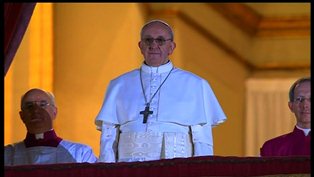 Washington (CNN) -- In the last two days, newly installed Pope Francis has become increasingly vocal about economics issues.
Washington (CNN) -- In the last two days, newly installed Pope Francis has become increasingly vocal about economics issues.
On Wednesday, the Pope Francis made reference to a building collapse in Bangladesh that killed upwards of 400 people in a sharp condemnation of worker exploitation and "slave labor."
"Not paying a just (wage), not providing work, focusing exclusively on the balance books, on financial statements, only looking at making personal profit. That goes against God!" Pope Francis in his homily.
On Thursday, Pope Francis continued with his economic message by tweeting "My thoughts turn to all who are unemployed, often as a result of a self-centred mindset bent on profit at any cost," to his almost 2.5 million followers.
The message was quickly retweeted by over 5,000 people at the time this story was published.
Some of the reaction was markedly negative.
"The Pope @Pontifex is tweeting about how bad profit is...from his very own opulent city-palace. The ultimate champagne socialist," said Mark Wallace on Twitter.
"Of course we should listen to the Pope on economics. Just like I follow medical advice given to me by my hairdresser," tweeted Patrick.
Francis' comments, however, seem in line with his predecessor, Pope Benedict XVI.
In a speech to the Food and Agriculture Organization, a Rome-based arm of the United Nations, Benedict condemned market speculators who have the "sole objective of profit."
"How can we ignore the fact that food has become an object of speculation or is connected to movements in a financial market that, lacking in clear rules and moral principles, seems anchored on the sole objective of profit," he asked the audience. "The speculator makes it his goal to maximize profit; for him, business is merely a means to an end, and that end is profit."
Additionally, in a 2009 letter to the United States Senate, the United States Conference of Catholic Bishops called on the legislative body to "place the needs of poor families and the most vulnerable in our nation and around the world first in setting priorities in the federal budget resolution."
"We are not policy makers, but pastors and teachers," the letter reads. "Our faith and moral principles call us to measure economic decisions on whether they enhance or undermine the lives of those most in need. Too often the weak and vulnerable are not heard in the budget debate."
These beliefs find an echo in some Catholic social teaching and papal writings.
In Centesimus Annus 10, a 1991 letter to all local Catholic Churches, Pope John Paul II wrote "The State cannot limit itself to 'favoring one portion of the citizens,' namely the rich and prosperous, nor can it 'neglect the other,' which clearly represents the majority of society. Otherwise, there would be a violation of that law of justice which ordains that every person should receive his due."
- Home
- News
- Opinion
- Entertainment
- Classified
- About Us
 MLK Breakfast
MLK Breakfast- Community
- Foundation
- Obituaries
- Donate
04-18-2024 3:44 pm • PDX and SEA Weather






















































































































































































































































































































